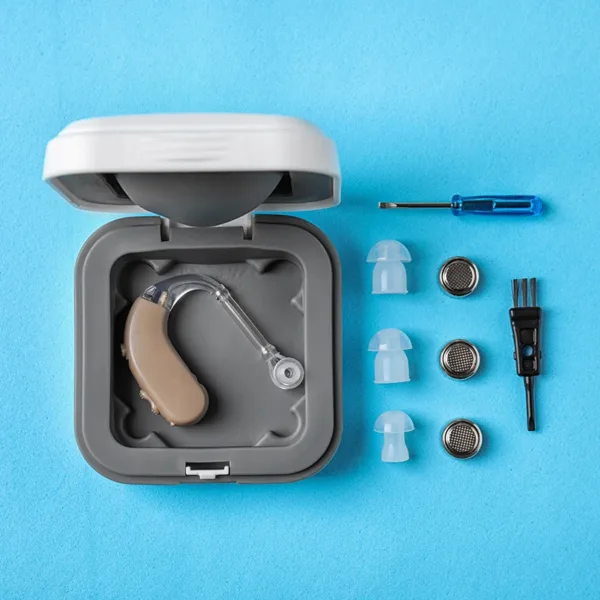
Open communication is the bedrock of meaningful relationships. While addressing sensitive topics like hearing loss can seem intimidating, these conversations are often necessary for helping your loved one get the support they need. In this guide, we’ll provide practical tips on how to bring up hearing loss with a loved one, so you can approach this important conversation with care and confidence.
Tips for Talking to a Loved One About Hearing Loss
When it comes to discussing hearing loss with a loved one, your approach can significantly impact the outcome of the conversation. Someone’s personal health can be a sensitive subject to broach, often filled with potential misunderstandings and emotional nuances. Conversations about hearing health are no different, and require empathy, understanding, and oftentimes, patience.
Below, we provide tips and strategies on how to approach the topic of hearing loss with compassion and respect. From recognizing the signs to offering assistance, we’ll guide you through the intricacies of these conversations, ultimately fostering an environment of open communication and support for the people closest to you.
Know the Signs of Hearing Loss

Understanding and recognizing the signs of hearing loss is an important step in supporting someone experiencing the condition. Some of the most common signs that someone close to you may be experiencing hearing loss include:
- Regularly asking others to repeat themselves
- Recurring miscommunications
- Listening or watching things at volumes that are uncomfortable to others
- Struggling to hear people on the phone
- Changes in their social life
- Seeming less engaged
- Trouble concentrating especially in noisy environments
- Forgetfulness
- Issues with balance and/or dizziness
- Changes in mood or mood swings
- Increased worry, stress, or anxiety
By recognizing these signs and offering support, you’re taking an important step toward fostering open communication and addressing hearing loss proactively.
Speak Up
Honest communication between you and your loved one is key for helping them find the help they need. However, it’s equally important to create an environment that is supportive, non-confrontational, and empathetic. For example, it’s common for individuals experiencing hearing difficulties to downplay or overlook their symptoms. In this scenario, an effective approach could be to start kindly drawing attention to the accommodations you make for their symptoms.
Simply asking if they want you to turn up the volume on the TV, or if they can hear you when in a noisy environment like a restaurant, can highlight the symptoms without sounding accusatory or critical. Instead, it conveys empathy and a willingness to help, while also starting a dialogue about hearing loss in a casual, low-pressure way.
Do Your Own Research
Before bringing up the topic of hearing loss with someone, it’s best to come prepared with your own knowledge. Learning statistics about the condition, symptoms, risks, and treatment options can help you speak about hearing loss with authority and answer any questions they may have.
You can also search for local hearing care specialists with great reviews in the area. Having this information on hand can be reassuring to people because it shows that professional care is readily available when they are ready to take the next steps. By investing time in research, you not only demonstrate your commitment and support but also contribute to a more productive and informed conversation.
Be Aware of Your Own Emotions
The topic of hearing loss can be emotionally charged for everyone involved. Being aware of your own emotions surrounding the matter and remaining calm and considerate will help ensure that the discussion goes as smoothly as possible.
Before talking to someone about hearing loss, make sure you’re feeling ready to have a calm discussion that will allow you to provide support without pressure or hard feelings. By demonstrating genuine care above all other emotions, this lays the foundation for a positive and constructive discussion.
Be Considerate of Their Emotions

It’s important to acknowledge the potential emotional challenges that your loved one may be experiencing surrounding hearing loss. Not only can it be frightening to experience, but hearing loss can also have a significant impact on mental health. Heightened stress levels, anxiety, self-esteem issues, and depression are all common emotional effects associated with losing your hearing.
If the person has had a long day, seems worn out, or is currently frustrated about a communication issue, it’s best to save the talk for a different time. If you do broach the subject and they aren’t ready to talk about it yet, make a conscious effort to be as caring and thoughtful as possible without pressuring them in any way. Remember, your role is one of support, and any dialogue is a step towards getting them the care they deserve.
Consider the Environment
Finding a calm environment sets the stage for both of you to engage in a more focused and comfortable discussion. A space that is private, quiet, and welcoming is an ideal setting for a potentially tough conversation and will also help limit any distractions that could hinder their ability to hear you clearly. It’s best if the environment is also brightly lit so they can see any visual cues they might rely on like reading your lips.
Ask About Their Apprehensions
As you initiate the conversation about hearing loss, it’s equally important to create a space for your loved one to express any apprehensions they might have. Addressing their concerns can contribute significantly to a more open and supportive dialogue and will provide you with the necessary context that can help in getting them care.
Start by expressing your genuine interest in understanding their perspective. Try to learn what they know about hearing loss and hearing aids to get an idea of how well they understand the condition and their treatment options. If they express specific fears or misconceptions, address them with accurate information. Dispelling myths and providing reassurance can alleviate concerns and contribute to a more informed decision-making process.
Some individuals may hesitate to address hearing loss due to fears about the process of seeking help or potential social stigma. Reassure your loved one that pursuing professional care is a positive and empowering step towards better hearing and a higher quality of life. This thoughtful approach can contribute significantly to the overall success of the conversation and the subsequent steps taken toward hearing loss treatment.
Appeal to Their Interests

Tailoring the conversation about hearing loss treatment to align with your loved one’s interests can be a strategic and compassionate approach to helping them get care. By highlighting hearing aid options that resonate with their lifestyle and preferences, you can make the prospect of addressing hearing loss more appealing.
There are custom hearing aids available today that can appeal to just about anyone. If your loved one is concerned about stigma or aesthetics, assure them that there are discreet hearing aids that are nearly invisible to others. Whether they enjoy music, outdoor pursuits, or social gatherings, tell them about hearing aid technology that allows for hyper-customizable features that can enhance any listening experience.
By appealing to your loved one’s interests, you make the conversation not only about addressing hearing loss but also about enhancing their overall quality of life. This approach reinforces the positive aspects of seeking help and can contribute to a more enthusiastic and open-minded response.
Provide Options
Recognizing that the journey to better hearing is a personal one, offering a variety of options for the next steps can be incredibly empowering. This approach can inspire them to take control of their hearing health at a pace that feels comfortable and manageable.
If your loved one is hesitant to visit a hearing clinic for a test, you can try suggesting that they take a free online hearing test at their leisure. You can also give them the contact information for a reputable hearing clinic near you so they can reach out to ask questions or get more information when they are ready.
Providing these kinds of options allows them to take the first steps at a pace that feels right for them, fostering a sense of autonomy and control over their hearing health journey.
Offer Your Support

Addressing hearing loss can feel like an overwhelming task. By actively participating in the process and offering continuous support, you can alleviate some of the apprehension. Simply offering to get more information for them, scheduling the appointment, or accompanying them to the hearing clinic, can foster a sense of confidence in taking the necessary steps. By being as supportive as possible, you become a crucial pillar in your loved one’s journey to improved hearing.
Find Additional Support at a Hearing Clinic Near You Today
When discussing hearing loss with a loved one, remember to come to them with love, not blame or frustration. By arming yourself with knowledge, empathy, and practical tips, you can address the topic in confidence, fostering a supportive environment that encourages them to seek the help they deserve.
Above all, always remember, you’re not alone in this process – our dedicated team of hearing care specialists are here to support you and your loved one every step of the way. Find an Audibel clinic near you today to explore our personalized hearing loss solutions.







Have a question or Comment?